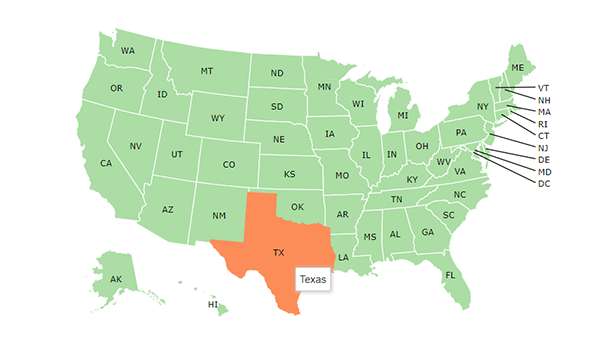File Small Claims Court in Texas Online
In Small Claims Court of Texas, any individual, business, or corporation may bring a small claims suit for the recovery of money when the amount requested is $4,000 or less. Even if you have a claim for a slightly greater amount, you may choose to voluntarily limit it to $4,000 in order to take advantage of the small claims court procedure. Attorneys are not allowed. A person filing must be 18 years of age or be represented by someone 18 or over. The person being sued must be 18 years of age. There cannot be more than ten (10) small claims cases filed by one individual or business in this court during any calendar year.
Texas is the second-largest state in the United States by both area and population. Geographically located in the South Central region of the country, Texas shares borders with the U.S. states of Louisiana to the east, Arkansas to the northeast, Oklahoma to the north, New Mexico to the west, and the Mexican states of Chihuahua, Coahuila, Nuevo León, and Tamaulipas to the southwest, and has a coastline with the Gulf of Mexico to the southeast.

Small Claims Court Limit For Texas
In Small Claims Court of Texas, actions can be brought for the recovery of money damages that do not exceed $20,000. The Small Claims Court cannot award more than $20,000, plus court costs, and it can award only monetary damages. The court cannot order a party to do anything or to refrain from doing something.
Texas Small Claims Court Fees
In the State of Texas, Small Claims Filing offers complete Filing and Serving services. The state of Texas Court fee is $41-$51. Serving includes restricted mail service sheriff/private process options will be provided to you later during the procedure. All fees are added to the case against the defendant so you can recover these costs. We will handle your entire small claims from start to finish!

To file your small claims case and serve the defendant, the price for this state is $74.95.
File Small Claims Court Texas Online
Why do you waste your time energy after a small claim? We are here to take pain for you. We are literate enough about the Small Claims Court System. We will get your claim filed and make you free from worries. We file Texas Small Claim in the relevant court. We provide proof after the task is completed. Our policy provides individuals and companies peace of mind.
Texas Small Claims Court Statute Of Limitations
The Statute of Limitation of Texas small claims court is 4 Years for a written contract, 4 Years is for Oral Contract, 2 Years is for personal Injuries, and 2 Years for Property Damage.
Texas Small Claims Court Forms
We use the right forms for Texas small claims court. Any other forms will not be accepted by the Texas small claims court. Our paralegal staff uses the correct forms and also fills it right.

Suing Someone in Texas Court Or Being Sued?
We, in Texas Small Claim filing offer in case if you want to file a case against somebody, we can help by:
- Serving Your Small Claims Papers Before The Deadline.
- Serve Your Claim In Proper Legal Way for Texas Court.
- Fill Your Proof With The Texas Court.


In case you are sued, we talk to the relevant person or company to settle things down. We appeal your small claim judgment as well.
E-Filing Services inTexas
Small Claim Texas E-file your legal documents to Texas courts that accept E-Filling on your behalf.
Recent Cases Filed in Texas Small Claims Court
Small Claims For Bad Cheque Or Payment in Texas
Texas Small Claim settles all money matters reliably and authentically if you are deceived in money matters.
File Small Claims in Texas For Security Deposit
In Texas Small Claim, if your former landlord refuses to return the security deposited you paid, we offer our services.
Texas Small Claims Filing if Refusing To Pay After A Car Accident
If someone ruins your car in Texas and refuses to pay for its repair, you can file small claims to recover your car accident damage. Small claims filingprepares all the documents to file a small claim in Texas court.
Direct Legal Small ClaimService inTexas
Court Filling Small Claim Texas Services
Throughout Texas in the small claims, we offer services to accommodate on the same day, next day, or routine service.
Who Can Sue Small ClaimInCourt Texas?
Those who can claim for Small Claim Texas are listed below:
- Married Couples can file small claims in Texas court.
- Business Partnerships can also file small claims
- Corporations can file small claims
- Government Agencies can file small claims
- Motor Vehicle Claims can be handled
- Minors can also file small claims in the court of Texas
- Prisoners can file small claims
- Bill Collectors can also file small claims in Texas
How Much Does It Cost To File A Small Claim Court, Texas?
There is a $30 filing fee for a case asking for up to $1500. To claim over $1500, and up to $5,000, there is a filing fee of $50. If your claim is above $5,000, the filing fee is $75. If you file more than 12 cases in a year, subsequent cases will cost $100.




